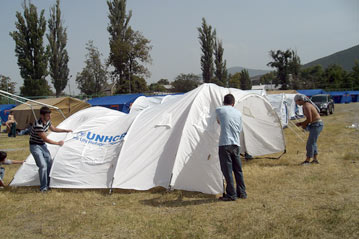Revised figures push number of Georgia displaced up to 192,000
Revised figures push number of Georgia displaced up to 192,000

TBILISI, Georgia, September 12 (UNHCR) - Revised figures based on fresh information gathered by the Georgian government and the UN refugee agency show that the total number of people displaced by the recent conflict over the South Ossetia breakaway region stood at 192,000.
The latest statistics, based on detailed profiling of internally displaced people (IDPs) in Georgia, break down the number of displaced into 127,000 people in Georgia proper, 30,000 within South Ossetia and another 35,000 to North Ossetia in the Russian Federation.
Earlier UNHCR estimates had put the total number of displaced at 158,000. But this failed to take into account many people who had been staying with host families in Georgia. Many of the families can no longer cope with the extra burden, a UNHCR spokesperson said.
Of the 127,000 IDPs in Georgia, 68,000 have since returned home. UNHCR and the Georgian government estimate that another 5,000 will go home before the onset of winter, raising the number of returnees to 73,000.
As for the remaining 54,000 IDPs, UNHCR estimates that 23,000 will need to be provided with alternative shelter through the winter months, but will be able to return home in 2009 once their houses have been rehabilitated. However, the remaining 31,000 individuals are not expected to return in the foreseeable future.
They originate from South Ossetia (22,000); from inaccessible parts of the so-called buffer zone between Georgia and South Ossetia (8,000); and from Abkhazia (1,000). Given that Georgia is already hosting 223,000 IDPs from previous conflicts, this new population will result in the longer term in Georgia having a total of 254,000 IDPs.
In another development, UNHCR in cooperation with the Georgian government is now putting an end to spontaneous relocations of IDPs from the capital of Tbilisi to the overcrowded tented camp in Gori, which is already packed with some 2,200 people.
Over the past week, several busloads of IDPs arrived spontaneously every day at the tented camp in Gori, claiming that they would rather stay in there than be relocated within Tbilisi.
In the Georgian capital, authorities are currently vacating schools and sending IDPs to alternative accommodation so the school year can start. However, some IDPs refuse to be relocated and spontaneously leave for Gori, where many of their relatives and neighbours are accommodated. However, Gori is filled to capacity and UNHCR prefers to reserve remaining tents in the camp for IDPs who were placed with host families who can no longer support them.








